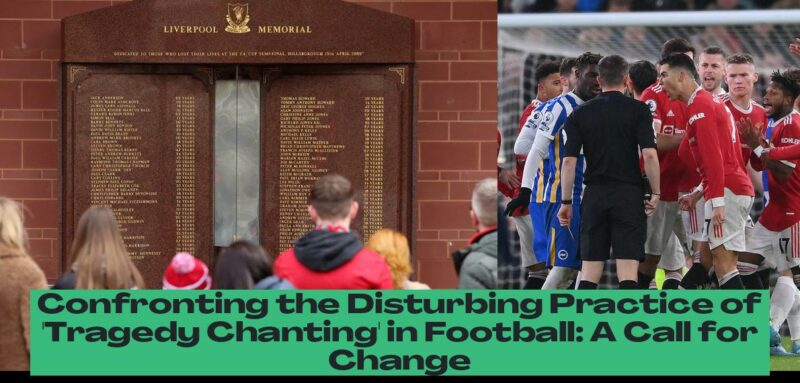Confronting the ‘tragedy chanting’ football fans
The roar of the crowd, the thrill of the game, the shared passion for your team – these are the joys of football that draw millions to stadiums across the globe. But for some, the beautiful game has a dark underbelly, a shadow cast by the callous act of “tragedy chanting.” This practice involves fans singing songs about disasters – often referencing the tragic events that have touched the hearts of rival clubs. It’s a practice that is not only insensitive but is also deeply hurtful to the families and survivors of those who lost loved ones.
Amanda Stanger, a football fan who was at Hillsborough the day 97 people died, is on the front lines of a battle against this vile behavior. She uses her own harrowing experience of the 1989 FA Cup semi-final between Liverpool and Nottingham Forest to educate fellow Forest supporters who have been arrested for tragedy-related abuse. This educational program is a lifeline for these fans, offering them a chance to reflect on their actions and ultimately avoid further punishment, which can include the confiscation of their season tickets and even prosecution.
Stanger’s work highlights the devastating impact of tragedy chanting on the victims, their families, and the wider community. These chants aren’t just insensitive; they are a painful reminder of a day that should never be forgotten. The chants can evoke raw emotions, triggering a flood of memories and grief that can be overwhelming for survivors and loved ones.
In 2016, an inquest found that the 96 fans – later increased to 97 after a further investigation – were unlawfully killed at Hillsborough. The crush occurred during a match at Hillsborough Stadium in Sheffield, England, on April 15, 1989. The verdict came after a long, arduous campaign by survivors, families, and supporters who fought for justice and accountability for the tragedy. The tragedy left a long-lasting scar on the hearts of Liverpool fans and the wider football community. It is a day that will forever be etched in the collective memory of the sport.
While no Forest supporters died at Hillsborough, 28,000 of them were present that day, witnessing the unfolding tragedy. In recent years, a group of Forest fans who were at Hillsborough have come together and benefited from trauma counselling made available by Liverpool supporters through the Hillsborough Survivors Support Alliance (HSA). This act of solidarity underscores the shared humanity and empathy that can bridge divides even in the face of deep sorrow. It’s a testament to the power of unity and healing in a sport that often brings people together despite their differences.
- Tragedy chanting in football involves fans singing songs about disasters, which can be deeply hurtful and insensitive.
- Amanda Stanger, a survivor of the Hillsborough tragedy, educates fellow fans to combat tragedy-related abuse through an educational program.
- Tragedy chanting can trigger raw emotions and overwhelming grief for survivors and families of victims.
- The 96 fans who died at Hillsborough were unlawfully killed, leading to a long campaign for justice by survivors, families, and supporters.
- Forest supporters present at Hillsborough have access to trauma counseling to cope with the lasting impact of the tragedy.
What does tragedy chanting mean?
Tragedy chanting is a form of verbal abuse that uses traumatic events as a weapon against rival fans. It’s a deeply insensitive and disrespectful act that seeks to inflict pain and humiliation on those who have already suffered immense loss. It’s not just about rivalries or banter; it’s about exploiting the pain and grief of others for the sake of a cheap thrill.
The chants often reference specific events that have become etched in the collective memory of football, like the Hillsborough disaster, the Munich air disaster, or the Heysel Stadium disaster. These tragedies are not mere events in history; they are reminders of the fragility of life, the power of collective grief, and the enduring impact of tragedy. To trivialize these events by using them as a means of taunting rivals is a betrayal of their significance.
The chants can take various forms, from crude and offensive slogans to songs that directly mock or belittle the victims. Some chants may reference the number of casualties, while others may contain specific details about the tragedy. These variations are all equally harmful and disrespectful, as they exploit the pain of others for the sake of cheap entertainment.
Tragedy chanting has no place in football or any other aspect of life. It’s a form of abuse that should be condemned and eradicated. It’s a stain on the sport, undermining the values of respect, empathy, and shared humanity that should guide all fans.
The Impact of Tragedy Chanting
The impact of tragedy chanting extends far beyond the immediate target of the abuse. It inflicts deep emotional wounds on survivors, families, and the wider community, leaving a lasting sense of pain, anger, and betrayal.
For survivors of tragedies like Hillsborough, the chants can trigger a flood of memories, reopening old wounds and renewing the pain they have endured for years. It can be a constant reminder of the trauma they experienced, making it difficult for them to move on and find closure. These chants are like a punch to the gut, reminding them of the day they lost loved ones and the pain that continues to haunt them.
For families who lost loved ones, tragedy chanting can be a deeply personal attack, a violation of their grief and a reminder of the injustice they have faced. Their pain is amplified by the fact that their loved ones are being used as a tool for taunting and humiliation. It’s as if their loss is being trivialized and their pain is being exploited for the sake of cheap entertainment.
The impact on the wider community can be equally profound. Tragedy chanting can erode trust and goodwill, fostering a climate of division and animosity. It can create a sense of fear and insecurity, making it harder for fans to feel safe and comfortable at matches. It damages the reputation of the sport, turning it into a breeding ground for hatred and intolerance.
Addressing the Issue
Addressing the issue of tragedy chanting requires a multi-faceted approach that involves a combination of education, punishment, and prevention. It is a collective responsibility, requiring the efforts of fans, clubs, and authorities to ensure that the beautiful game is not tarnished by this vile practice.
Clubs play a crucial role in educating their supporters about the impact of tragedy chanting and the need for respect and empathy. They can implement programs that highlight the history of these tragedies, the pain they caused, and the importance of remembering them in a dignified and respectful manner. They can also work with fan groups to create a culture of tolerance and understanding.
Authorities, including the police, the Crown Prosecution Service, and the Football Association, have a critical role to play in deterring and punishing those who engage in tragedy chanting. They can introduce stricter penalties, including fines, bans, and even criminal prosecution, to send a clear message that this behavior is unacceptable and will not be tolerated.
The football community as a whole has a collective responsibility to condemn and challenge tragedy chanting. Fans can play a crucial role in calling out this behavior, using their voices to create a culture of intolerance for such acts. They can also work with clubs and authorities to ensure that these issues are addressed effectively.
The Need for Change
The battle against tragedy chanting is a long and ongoing one. It requires sustained commitment and effort from all stakeholders – fans, clubs, and authorities – to ensure that the beautiful game is not tarnished by this vile practice.
By working together, we can create a footballing environment where respect, empathy, and shared humanity prevail. We can ensure that the memories of those who lost their lives in tragedies are honored with dignity and respect, and that the beautiful game is not marred by the callous actions of a few.
It’s time to reclaim football as a force for good, where the spirit of sportsmanship and fair play reigns supreme. Let’s work together to build a future where tragedy chanting becomes a thing of the past, and where the beautiful game truly lives up to its name.









